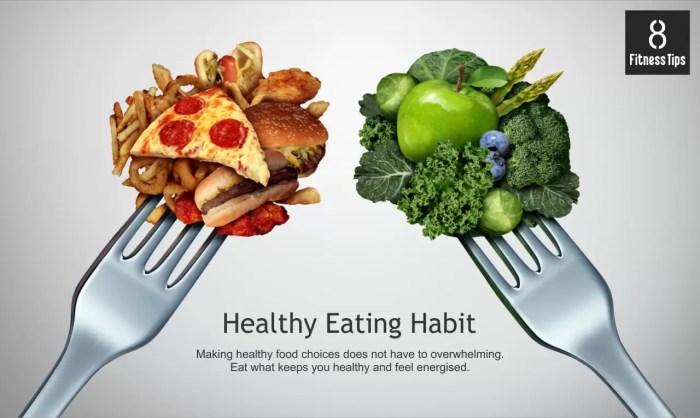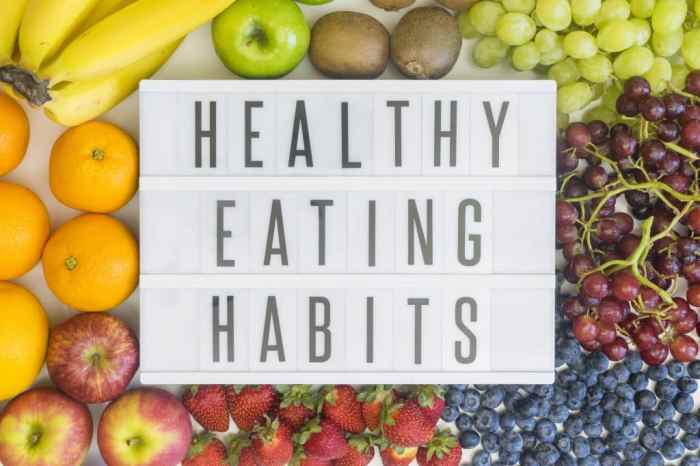Healthy Eating Habits sets the stage for this enthralling narrative, offering readers a glimpse into a story that is rich in detail with American high school hip style and brimming with originality from the outset.
Embark on a journey to discover the transformative power of healthy eating habits and how they can revolutionize your overall well-being.
Importance of Healthy Eating Habits

Eating healthy is crucial for overall well-being as it provides our bodies with the necessary nutrients to function properly. By adopting healthy eating habits, individuals can experience a wide range of benefits that positively impact both their physical and mental health.
Physical Health Benefits
- Improved immune system: Eating a balanced diet rich in vitamins and minerals helps boost the immune system, reducing the risk of infections and illnesses.
- Weight management: Maintaining a healthy diet can help control weight, reducing the risk of obesity and related health conditions such as diabetes and heart disease.
- Increased energy levels: Consuming nutritious foods provides the body with the energy needed to stay active and productive throughout the day.
Mental Health Benefits
- Enhanced mood: Certain foods, such as those rich in omega-3 fatty acids, have been linked to improved mood and reduced symptoms of depression and anxiety.
- Sharper cognitive function: Eating a diet high in antioxidants and healthy fats can support brain health, improving memory, focus, and overall cognitive function.
- Reduced stress levels: Consuming a variety of nutrient-dense foods can help regulate stress hormones and promote a sense of calm and well-being.
Components of a Healthy Diet

Eating a balanced diet is crucial for maintaining good health and overall well-being. A healthy diet consists of a variety of nutrients that come from different food groups to ensure that our bodies get all the essential vitamins, minerals, and energy they need to function properly.
Key Food Groups for a Balanced Diet
- Protein: Foods like lean meats, poultry, fish, eggs, beans, and nuts are rich in protein, which is essential for building and repairing tissues in the body.
- Fruits and Vegetables: These are packed with vitamins, minerals, and antioxidants that help boost the immune system and reduce the risk of chronic diseases.
- Whole Grains: Foods like brown rice, whole wheat bread, oats, and quinoa provide fiber, which aids in digestion and helps keep you feeling full longer.
- Dairy: Milk, yogurt, and cheese are excellent sources of calcium, which is crucial for strong bones and teeth.
- Healthy Fats: Avocados, nuts, seeds, and olive oil contain unsaturated fats that are good for heart health and overall well-being.
Importance of Fruits and Vegetables
Fruits and vegetables are rich in vitamins, minerals, and antioxidants that are essential for good health. They help reduce the risk of chronic diseases such as heart disease, diabetes, and certain types of cancer. Incorporating a variety of fruits and vegetables into your daily meals can improve digestion, boost immunity, and promote overall well-being.
Nutrient-Rich Foods to Include in a Healthy Diet
- Salmon: Packed with omega-3 fatty acids, salmon is great for heart health and brain function.
- Spinach: This leafy green is loaded with iron, vitamins A and C, and antioxidants that support immune function.
- Blueberries: Known for their high antioxidant content, blueberries are great for brain health and reducing inflammation.
- Almonds: These nuts are a good source of healthy fats, fiber, protein, and vitamin E, which is beneficial for skin health.
- Greek Yogurt: Rich in probiotics, calcium, and protein, Greek yogurt is great for gut health and bone strength.
Tips for Developing Healthy Eating Habits
Developing healthy eating habits is crucial for maintaining overall well-being. Here are some practical tips to help you establish and sustain a nutritious diet:
Design a Weekly Meal Plan
Creating a weekly meal plan can help you ensure that you are consuming a well-balanced diet. Consider incorporating a variety of fruits, vegetables, whole grains, lean proteins, and healthy fats into your meals. Planning ahead can also save time and money, making it easier to stick to nutritious choices throughout the week.
Avoid Unhealthy Food Choices
One key strategy for developing healthy eating habits is to steer clear of unhealthy food options. This includes highly processed foods, sugary snacks, and foods high in saturated fats. Instead, opt for nutritious alternatives such as fresh fruits, vegetables, nuts, seeds, and whole grains. Keeping these items on hand can make it easier to resist temptation when unhealthy cravings strike.
Prepare Healthy Snacks, Healthy Eating Habits
Having a list of healthy snacks readily available can help you stay on track with your healthy eating goals. Consider snacks like cut-up veggies with hummus, Greek yogurt with berries, or a handful of almonds. These options can provide a quick and satisfying way to curb hunger between meals without derailing your progress towards a healthier lifestyle.
Impact of Healthy Eating on Physical Health
Eating a healthy diet can have a significant impact on your physical health by preventing chronic diseases such as diabetes and heart conditions. In addition, a balanced diet plays a crucial role in improving metabolism and boosting energy levels. Furthermore, healthy eating habits can contribute to weight management and overall fitness.
Prevention of Chronic Diseases
- Eating a diet rich in fruits, vegetables, whole grains, and lean proteins can help reduce the risk of developing chronic diseases like diabetes and heart conditions.
- Consuming foods high in antioxidants and omega-3 fatty acids can help protect against inflammation and oxidative stress, which are linked to chronic diseases.
Improved Metabolism and Energy Levels
- A diet that includes a variety of nutrients, vitamins, and minerals can support a healthy metabolism, helping your body efficiently convert food into energy.
- Eating regular meals and snacks that are balanced in carbohydrates, proteins, and healthy fats can help sustain energy levels throughout the day.
Weight Management and Overall Fitness
- Choosing nutrient-dense foods over processed and high-calorie options can aid in weight management and promote a healthy body composition.
- Incorporating regular physical activity along with a healthy diet can enhance overall fitness levels and contribute to a healthier lifestyle.
